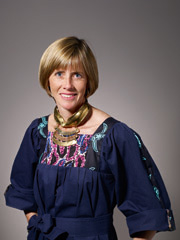E-voting: why is UK not as smart as the Philippines?
Before e-voting it took 40 days to tot up Filipinos’ votes - now it takes 48 hours: what’s not to like?

A free daily email with the biggest news stories of the day – and the best features from TheWeek.com
You are now subscribed
Your newsletter sign-up was successful
As the UK's political parties continue to circle each other like Great White Sharks around an injured surfer in preparation for the general election next May it’s worth spending a moment on what outcome we’d all hope to see regardless of what party we’re voting for.
Imagine high turnout rates, including from those aged between 18-25. Imagine elections costing the government (and you) less than the £80 million they do now. Imagine choosing where you want to vote - in the ballot box, at home or even via your mobile phone.
I went to see Lord Malloch-Brown after he laid out his vision in the New Statesman for how the experience of voting in the UK might differ if we ditched pen and paper for a more modern form of communication.
The Week
Escape your echo chamber. Get the facts behind the news, plus analysis from multiple perspectives.

Sign up for The Week's Free Newsletters
From our morning news briefing to a weekly Good News Newsletter, get the best of The Week delivered directly to your inbox.
From our morning news briefing to a weekly Good News Newsletter, get the best of The Week delivered directly to your inbox.
The former government minister has just become chair of Smartmatic which provides election voting and digital identity services. They’re working in the Netherlands, Belgium, Brazil, the Philippines, Estonia and Haiti, as well as providing the machine that President Obama recently cast his vote on in Chicago.
The Philippines is a fascinating example of how you can transform a country with voting technology. When I worked for Mark Malloch Brown in the 1990s at Sawyer Miller, a political strategy and communications firm, he had advised Corazon Aquino as she ran for President of the Philippines.
At that point the Philippines was just emerging from the Ferdinand Marcos dictatorship. While the country embraced democracy, it wasn’t without difficulties. With 2,000 inhabited islands and 18,000 political seats up for grabs in each election, vote-counting took up to 18 hours in each polling station and up to 40 days to reconcile the votes nationally.
In that period, and in the elections that followed, dozens of lives were lost in the violent disputes erupting around the vote count. Compare that with the May 2013 midterm election in which the victors were announced 48 hours after even the most remote islander had cast her vote on an electronic voting machine.
A free daily email with the biggest news stories of the day – and the best features from TheWeek.com
A country doesn’t have to be geographically complicated to embrace e-voting.
Estonia was the first country in the world to adopt Internet voting as a tool, and as many as 30 per cent of the Estonian electorate have voted online in seven general elections over the last ten years.
According to Lord Malloch-Brown, Estonians also like the “ritual of citizenship” - many still want to go to the polling station. He also points out that Estonia has a very high degree of civic trust and is leaps ahead in combining technology with governance - as of this year it's government has gone completely paperless.
Before you bring your baby home from the hospital in Estonia the government has issued him or her a digital birth certificate which automatically starts their health insurance. All Estonian residents 15 or over have electronic ID cards. These are used in health care, electronic banking and shopping, to sign contracts and encrypt e-mail and even as tram tickets.
So why aren’t we all rushing to embrace electronic voting? Malloch-Brown says that in Britain there is a certain “reticence” about leaving behind the tried and true method of putting an X on a piece of paper and placing the paper in a box. And - as with anything digital - there is a concern in the wake of Snowdon’s revelations about putting any more of yourself online than is strictly necessary.
But Malloch-Brown pointed out to me that "we now expect consumer friendliness and a certain embrace of technology in our shopping and banking. Is it too much to expect in our voting?"
Just as you want your vote to belong to you, and known by no one else, you want your digital identity to belong to you. As I’ve argued before, the experience doesn’t have to be scary if you’re in control of your data and what parts of your identity you share.
And it is cheaper. Haiti - the poorest country in the Americas - will start biometric registration next year. Part of the civil identity registry will aid Haitians’ ability to vote electronically, even in remote areas. If they can afford it, so can we.
Americans - who are also worried about their digital identity - are already starting to pay with mobile devices. Apple announced this week that Apple Pay-enabled devices are able to accept credit cards which cover 90 per cent of purchases in the US. Half of McDonalds mobile phone payments are now done via Apple Pay.
Of course, voting for the next Prime Minister is not the same as buying a burger. But shouldn’t it be as easy?